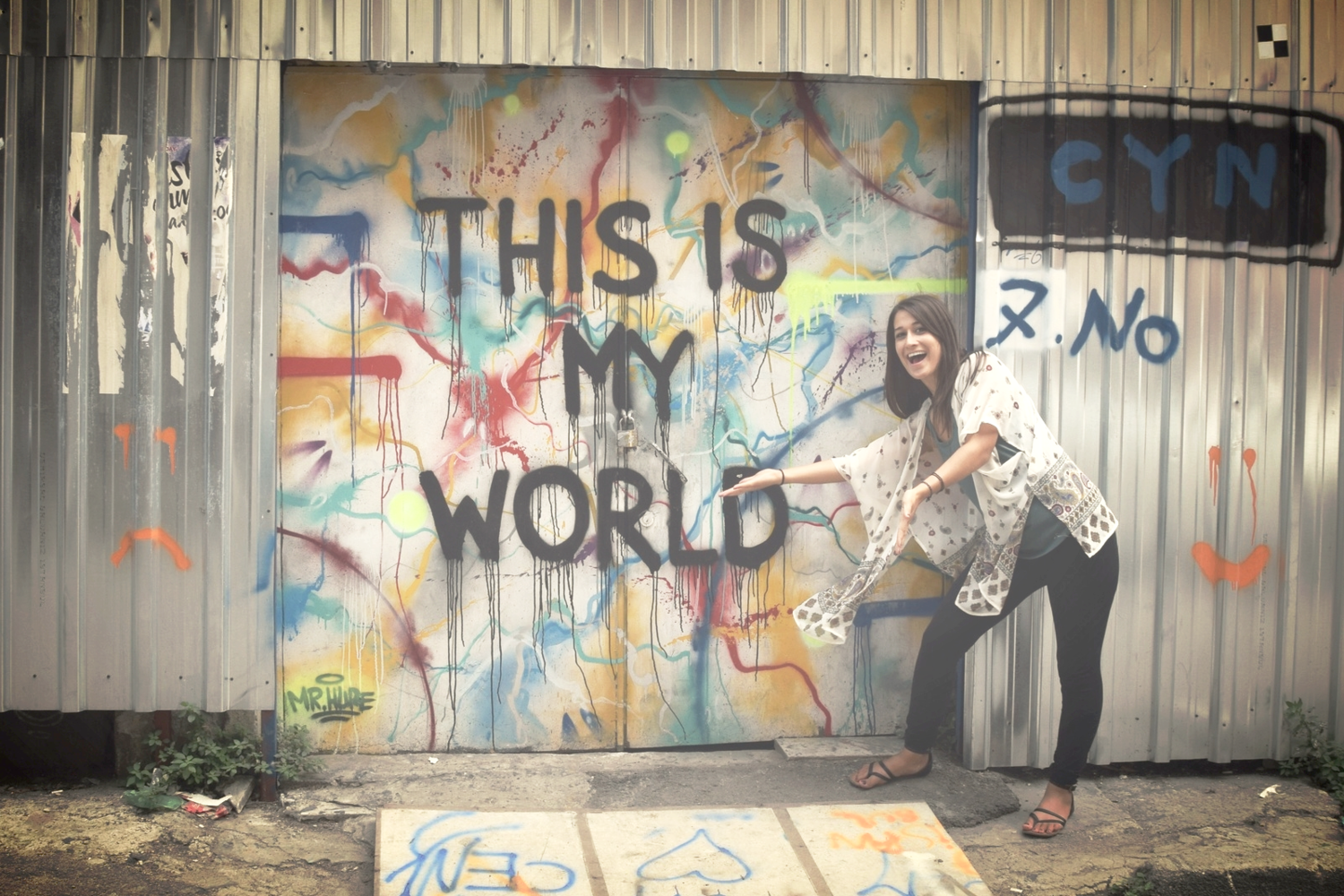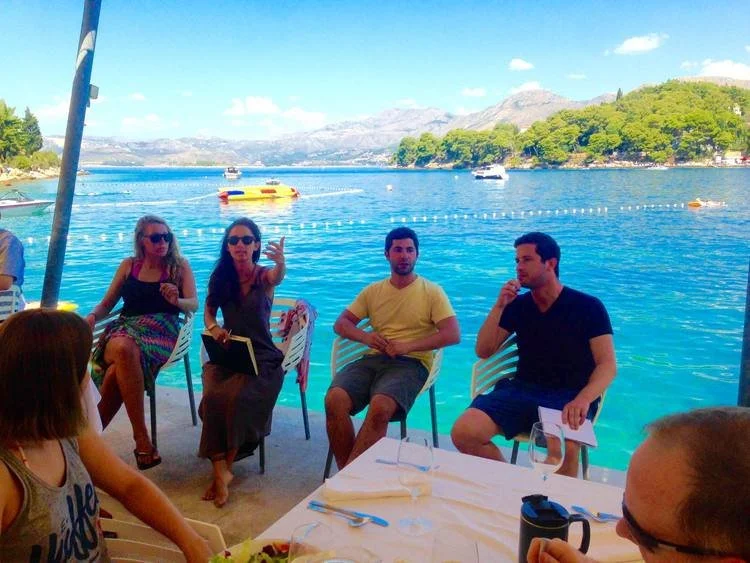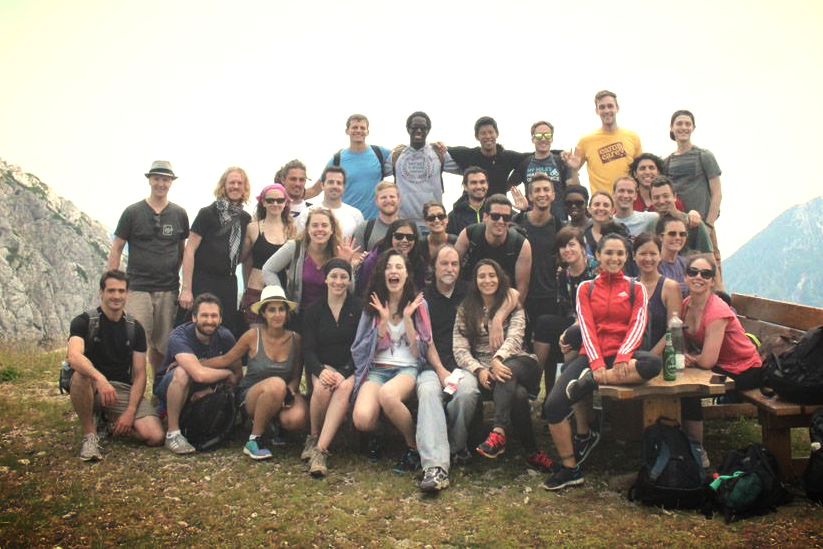Remote Year: What to Expect from the Remote Work Travel Program
Update: Since publishing this article Remote Year has shut down. Remote Year was acquired by Collective Hospitality in August 2024 and abruptly shut down at the end of December 2024.
Kate Smith in Istanbul, Turkey
Remote Year is a program that takes 75 professionals to a new country every month for a year, all while working remotely. As you can imagine, there are a lot of people interested in this opportunity. Thinking about applying? Here is what you can expect if you join the program.
Group Dynamics and Sense of Community
White water rafting. Soca River, Slovenia.
Locus co-working space in Prague Czech Republic
If there is anything I've learned from being on Remote Year, it's the strong sense of community. I came to Remote Year without a job, and I felt so much support from everyone around me, trying to help me as much as they could. It was a stressful time for me, but everyone always greeted me with a huge smile and support. They helped me in any way that they could, providing me with resources, job postings, networking opportunities, and I even had someone offer to lend me money should I need help. I wouldn't have been able to accept that, and luckily, I found a job, but that gesture spoke volumes, especially since I had only known everyone for a few weeks at that point.
We have people from 15 different countries participating in the program. Everyone is very different, but at the same time, we hold a very common, powerful bond. We love to travel and feel as though you should truly live life and do what makes you happy. To us, it means breaking the 9 to 5 to have a work-life balance that makes us feel happier and more fulfilled. The most interesting thing to me is that everyone is so different in so many ways, but everyone gets along, everyone is open to getting to know one another, and everyone wants to be successful at being a digital nomad. It’s not always easy to transition to this digital nomad lifestyle, but everyone supports each other along the way.
To me, this is the type of group that has no self-interest; instead, the interest of our greater Remote Year community. We share what we have from our meals around the dinner table,e to knowledge to help one another. There is a sense of "what is mine is yours" type of vibe. There is also the sense that this group wants all of us to succeed. It's not a competition against each other. We are there for each other personally and professionally, to help one another succeed. One person's success is the success of the group. This is the strongest sense of community I've ever felt in my life, and for that, it’s made me a better person.
What You Pay For
There are two things you are paying for. One is tangible, and one goes way beyond tangible, and the price you put on that is up to you.
The intangible items include:
Association with the Remote Year name. There is a lot of publicity surrounding Remote Year, which presents great opportunities for participants. For me, it’s helped in building a brand for my blog. I've already been featured in Mashable, BuzzFeed, National Slovenian TV, and a documentary.
A networking community of 70 people who are smart, hardworking, and driven individuals. This presents opportunities, especially for jobs and personal and professional growth.
You don't have to worry about any travel logistics. Remote Year takes care of all of our travel logistics. Working 40 hours a week, on top of planning your travels across 12 countries within a 1-year timeframe, would be very challenging. I find it would take away from experiencing the current country you're in, and instead, you would always be thinking of what's next.
A group to travel with that "gets you". Joining Remote Year, you instantly share a common bond with the participants, given it takes a unique individual to pick up their life and travel with a group of "strangers". You can find your sense of community at local co-working spaces and among the digital nomad community, both online and offline; however, Remote Year provides you with a consistent sense of community throughout a whole year. Traveling so frequently, there is value in any sense of consistency or stability, since that's the hardest and rarest thing to find when traveling.
Remote Year teaches you how to be a digital nomad. I've learned a lot about how this whole digital nomad lifestyle works. Remote Year provides a good transition into this lifestyle, making it easier and less overwhelming than just jumping right into it yourself. I feel that after this year, I will be able to manage being a digital nomad on my own.
70+ places to crash when traveling. Between the network of the 70 participants from 15 different countries, along with the people you meet on the way, you will always have a place to crash when traveling!
Tangible items included in our $2,000 USD monthly fee are:
24/7 wifi access. The key here is strong and reliable wifi. Many places have wifi, but not necessarily good wifi. If the wifi sucks, it's on Remote Year to figure out. One less stress for those on the program.
A workspace. This has included shared co-working spaces with locals to a "pop-up workspace" in a hotel conference room.
A room to ourselves. We always have a room to ourselves. Sometimes kitchens, washrooms, or apartments are shared, but we will still have a room to ourselves.
Transportation between countries. This can be long bus rides or plane rides, but it's all included in your fee.
SIM cards ready upon arrival (should we opt in).
Travel insurance should you decide to opt in.
A portion of the group activities that I talk about more below.
Meals twice a week (usually breakfast or lunch). Check with your program to see if this is included.
The Living Situation
Our living situation has varied a lot, but regardless, we are always guaranteed our own room. Also, keep in mind when I say "kitchen", that typically means a fridge and a stove top, not necessarily an oven. For me, this has included:
A hotel with my own washroom, a mini fridge at request, and no kitchen. I had to go to a laundromat in town for laundry. During the month I lived here, the group was spread across multiple hotels across the city.
An apartment with my own washroom and kitchen. It was an apartment style, but when I walked out my front door, I had my own private terrace that overlooked the Adriatic Sea. It was beautiful! This included access to laundry on site at no extra cost. This month, a small group of us lived in the same house (which was turned into apartments). The rest of the group was spread across the town in various apartments/houses.
A high school dorm with a shared kitchen and 2 large fridges on the main floor, for the entire building. This wasn't exactly ideal when you were on the 4th floor, or in terms of cleanliness or ease of access. We also had shared washrooms among a small apartment "pods". For laundry, you would drop your laundry off in a bag at the front, and for a certain price, they would wash, dry, and fold your clothes. I just washed my clothes by hand this month. 90% of the group stayed in the same dorm building, and the remainder of the group stayed at another dorm.
A university dorm that has a shared kitchen, but our own washrooms and a mini fridge in our room. A common laundry room is in the basement that you pay to use. This month, everyone was in the same building.
At one point, I bought a $20 hot plate, the tiniest little frying pan, the tiniest little pot, and a mini $20 kettle. Europe is amazing for finding compact and small items.
Make sure you're clear on the quality level of accommodations - understand your expectations and make sure that they meet what Remote Year can provide. Do you need 5 5-star all the time? Quality level can vary, so managing expectations can prevent any surprises.
The Staff
The staff are amazing people and integrate well with the group. When we first started out, it was common for staff to regularly hang out with participants, but as the company has grown, staff are oftentimes dispersed among countries and groups, and with the increase in staff size, they frequently hang out among other staff.
Travel and Integration To and From Countries
Before heading off to a new country, we receive a country preview. This is provided by Remote Year and gives us insights and tips before heading to a new country. This allows us to have a smoother integration into a new country. We also receive a country preview that highlights our accommodations, includes a Google map of our home base, the workspace locations, gyms, grocery stores, as well as restaurant and nightlife recommendations. The start of a new month usually consists of a full day bus ride or flight/(s). Remote Year usually has some snacks and water for everyone, but it's also a good idea to bring some of your own as well.
Professional Development
Networking event at Kolektif co-working space in Istanbul, Turkey.
Trish, Hannah, Greg, and Sam in Cavtat, Croatia.
Everyone in the group has a wide range of skill sets that are complementary, which leads to a lot of knowledge sharing. In addition to Remote Year professional development activities, if there is an event or workshop we want to host as participants, we make it happen. We help shape what we want Remote Year to be for us, and Remote Year is great at supporting and providing that for us. I've learned A LOT from everyone. When I first arrived, it was evident this was a group of hand-picked individuals. It's crazy how much I feel I've already grown. Professional development events have included:
Guest Speakers: We've had speakers cover everything from intro to public relations, a workshop on learning how to sell, and even a guest speaker who is looking to form a country called Liberland.
Visits to local businesses: There were a couple of visits to local businesses, including visiting an ABC Accelerator program for new ventures in Ljubljana, Slovenia, and Eaton Centre in Istanbul, Turkey.
Update: The following was removed from the Remote Year Program
Pro Pods: Professional development "pods" where we break into smaller groups of about 3 people to discuss our professional goals, how we can achieve them, and keep each other accountable. Note: These
Skill Sharing Workshops: This has included learning how to knit with April, Video Editing with Haseeb, and a Life Hacks session, where we come together to find solutions for random everyday problems from personal to professional. The best app for this or that, how to solve a certain problem, etc.
Update: The following was added to the Remote Year Program
The Junction: The Junction is a professional networking event where locals and remote year participants come together to network over food and beverages. The event is structured so that some remote year participants and some locals get on stage to present their businesses, projects, etc.
Community Impact: It seems now that every month, Remote Year tries to do a give-back/ community impact activity. Whether that's volunteering at a local school or animal shelter.
Fun Activities
Each month, there are a variety of activities that happen that are posted in a shared Google calendar. The bigger events usually happen once a week, on the weekend. And the smaller, not-so-time-consuming events happen throughout the week, usually in the evenings. Community managers of Remote Year oftentimes connect with locals to find opportunities for unique experiences. Some examples of events that we have done include:
Local Events:
Baseball game with locals
Odprta Kuhna 'Open kitchen', which is a unique food market in Ljubljana, Slovenia
Beach party in Cavtat, Croatia, again with locals
Fourth of Juljubljana celebration in Slovenia - one of my favourites! It was a 4th of July party that locals put on, I think as some sort of joke, but it was a really fun time! It was an outdoor party in the middle of the woods, full of all the locals, except us. There was an opening in the forest, and they set up a DJ, dance area, a bar where you could get food and drinks (if you ran out of your own alcohol), and a bonfire.
Visiting the 'must-see' places in the countries we visit:
Day trip to Karlovy Vary
New Country Welcome Events: Usually, once we arrive in a new country, we have a day where we all get together to celebrate a new month. This has included mixers with locals at local co-working spaces to more "chill" events such as a movie night.
Country Departure Events: One of our last evenings in each country, we get together to celebrate our month in that country. This has included a boat ride down the river in Prague to a full day of volleyball, swim races, and dinner in Croatia.
Hikes. There tends to be one hike a month. Yes, we got to hike the Alps in Slovenia! We had some locals from our workspace join us, and one showed us how to 'moon rock' down the mountain. You can check out the video that Silvija Reinholde made above.
Walking tours. These have been a unique and local experience. We did a street art walking tour in Slovenia, led by one of the locals from our workspace. We also had one of our remotes from Turkey, Sila, give us a tour around her beautiful city of Istanbul.
Film under the stars. We watched a movie outside, under the stars, on a projector screen at Ljubljana Castle
Sunset Kayaking in Croatia
Language Lessons. This seemed to only happen for a few months.
Guided Meditations
Men's and Women's Night: Every few months or so, we have our men's and women's night. It's a chance for the ladies to have time to connect, and the same with the gentlemen. For the women, this has ranged from Acro Yoga to a boat ride to an island for dinner to a more low-key chocolate tasting and intention setting for the month. Typically, women's night is planned by Remote Year, and men’s night is planned by participants.
Side Trips: It's also common for individuals among the group to plan smaller group side trips to different countries. This has included Italy, Bosnia, Greece, etc. There are usually a couple that happen per month and are organized amongst participants.
The Group Size
Remote Year Group Hiking the Alps
In terms of the number of people on the program, it's the perfect size. With 70 participants, it's enough of us that you can always spend time with someone new and can go off in different smaller groups. It's not as though we're 70 people traveling side by side 70 throughout cities. That being said, we do have group events where a large number of us attend. Keep in mind we're 70 people who are different, which means we all have different interests. Some of us may be more keen on a hike, whereas others may prefer a language lesson. With so much going on, there is always something for someone to do. Update: By the end of Remote Year, this number was around 40/45 people.
In the larger cities, with so much going on, you may not see people often as everyone is out and about exploring. Alternatively, in the smaller cities, you may find yourself passing by fellow Remotes often.
With 70 people, it also means a great support system. You have 70 people who “get you”. They understand why you want to travel and opt out of a typical office job. They'll understand the ups and downs of packing your life into a suitcase and each month calling a new place home. I've never been surrounded by so many people who just 'get me'.
The Age Demographic
The average age is 30 but I feel like it's closer to 26, given some outliers. I believe our age range is from 22 years old to 50 years old.
Communication
The most popular way we communicate daily is through Slack and WhatsApp. Slack is more for reaching out to the group as a whole and has different channels, such as fitness, general, alternative workspaces, nightlife, foodies, etc. This makes it easy to throw something out there to the group, then whoever is interested in an activity or has an answer to a question can respond there. WhatsApp is also used in place of texting or calling people. Finally, we have our private Facebook group where we share articles, pictures, etc. As I mentioned before, you can opt-in to have a SIM card ready upon your arrival, leaving one less thing to worry about when you arrive in a new country.
Addressing Our Needs
Given that our group is the first group, Remote Year works at evolving the program to make sure it meets our needs.
Town Hall: The Town Hall happens once a month, where we talk about what's upcoming, any activities, and discuss any concerns or feedback we have.
Survey Feedback Form: At the end of each month, as we depart a country, we complete a survey feedback form. This helps Remote Year understand what we liked, what we want more of, and what can be improved.
Open Hours: Once a week, there is time booked called "Open Hours" where we can personally meet with a member of the Remote Year team to discuss the program.
The staff organizing everything is great, and they try to make the process smooth and seamless for us. That doesn’t mean hiccups don’t happen, but when they d,o the team is fast to respond to address whatever issue we may face.
Finding a Job and Working In Different Time Zones
Want a remote job? Start here with this step-by-step guide to becoming a digital nomad.







